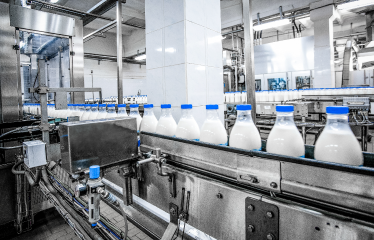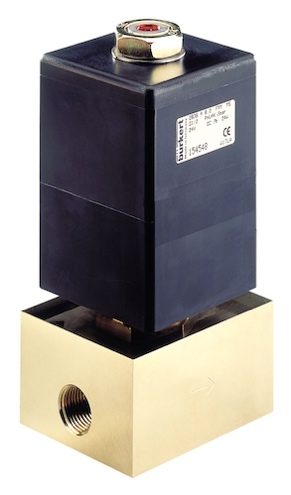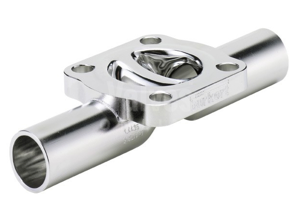
Managing Milk Flow In Dairy Production Through The Use Of Valves
Efficiency and precision are paramount in the intricate process of dairy production, where the quality and consistency of foods such as yoghurt and cheese are reliant on the controlled management of milk flow. Managing milk flow in dairy production, a crucially pivotal task, is accomplished through the strategic implementation of valves, devices that regulate and direct the flow of milk.
In this article, we delve into the importance of managing milk flow in dairy production and the instrumental role of valves in elevating production processes for those within the dairy industry.
The importance of managing flows in dairy production
The significance of managing milk flow within dairy production operations cannot be overstated as it is crucial to ensuring a smooth process and a good output of product. A controlled and well thought out approach to milk flow management offers several vital benefits. Let us walk you through some of these now.
Consistency in quality
With milk compositions varying so much in different cows, this can significantly impact the final product. With meticulous regulation of milk flow, diverse milk sources can be blended to achieve consistent quality levels that will meet consumer expectations.
This aspect of the production process is vitally important as the end product has to be of a high enough standard to prove fruitful for the production company.
Operational efficiency
Dairy production is quite often controlled by tight schedules and operational efficiency. Managed milk flow minimises disruptions along the processing line, resulting in streamlined production cycles and timely product outputs.
Resource utilisation
Efficient milk flow management translates to reduced wastage, protection against unnecessary loss, and optimising the utilisation of resources.
In order to ensure no wasted resources, managing milk flow in dairy production is a sure way to achieve this.
Product diversification
Modern dairy production covers a wide range of products, each necessitating specific attributes of milk itself. Think about it, you’ve got various kinds of cheese, yoghurt, milks – there’s a lot to facilitate here.
The management of milk flow enables producers to allocate milk streams to various processes and production streams, aiding the creation of an assortment of products, like those we’ve mentioned above.
Equipment durability
The unceasing flow of milk exerts considerable strain on equipment. Prudent milk flow management mitigates stress on machinery, consequently prolonging their lifespan and mitigating repair-related costs.
What do valves do in the milk flow process?
Valves are widely considered to be assets in the orchestration of milk flow within the dairy production fields. Their multidimensional uses and functions contribute to the enhancement of production processes which are incredibly valuable to those within dairy production.
Quality assurance
Industrial valves play a pivotal role in maintaining uniform milk quality. By regulating flow rates, producers can ensure a consistency of milk compositions, ensuring consistent product quality and consumer satisfaction.
Flow control
Valves act as efficient regulators, avoiding surges of milk and preventing wasteful spills. This control not only curbs wastage but also contributes to cost-effective production.
Process adaptability
The versatility of valves enables milk streams to be redirected to diverse production processes. This adaptability empowers dairy companies to create a range of products with precision, reliability, and efficiency.
With so many different products on the market now, this diversity of product production can make a world of difference to a company’s stocking opportunities and profit numbers.
Precision processing
Precision is paramount in dairy products. Valves contribute to the precision of each production phase, be it pasteurisation, homogenization, or packaging, by enabling consistent and controlled milk flow.
Selecting an ideal valve supplier
In the contemporary landscape of dairy farming, the indispensability of automated control systems and sophisticated monitoring technology for substances cannot be overstated.
Here at BM Engineering, we stand as the premier source for an exhaustive range of products and integrated systems tailored to meet the entirety of your dairy technology requisites. Our strategic alliances with industry giants, Bürkert and Inoxpa, amplify our capabilities, positioning us as prime purveyors of automated components for dairy farms.
With an unwavering commitment to equipping you with cutting-edge solutions, we present a comprehensive suite of instrumentation meticulously curated to empower seamless management of your fully automated dairy farm operations.
Choose BM Engineering for your valve supplier
Here at BM Engineering, we have a range of products and valves that are well suited to your specific needs. We understand the importance of managing flows in dairy production, which is why we have specifically crafted our product range to be applicable to a wide range of industries and requirements.
With valves ranging from ball valves to butterfly valves, we’ll have a valve suited to your industrial requirements. Get in touch with us today to talk about our complete range of valves for use managing milk flow in dairy production by calling 0141 762 0657 or email sales@bmengineering.co.uk.



